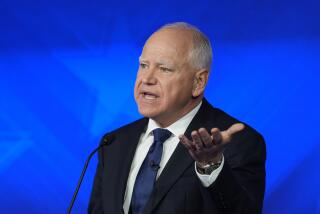One Small Step for China
- Share via
China has opened its prison gates long enough to let out Wang Dan, a hero of the 1989 Tiananmen Square protests who was serving an 11-year sentence on the blanket charge of conspiring to subvert the state. Wang’s release had long been sought by the United States and various international human rights groups.
Freedom for Wang--technically medical parole for the asthmatic 28-year-old--is welcome, though its significance should not be overvalued. This is a cosmetic gesture timed to smooth the way for President Clinton’s visit to China in June. It does not herald a basic change in Beijing’s intolerance of those who challenge its authoritarian rules and practices. But it may signal something else.
A few weeks ago the Clinton administration announced it would drop American support for a resolution before the U.N. Human Rights Commission condemning China’s record on human rights. In return, Washington asked China to sign a U.N. Covenant on Civil and Political Rights and to set free its imprisoned dissidents, of whom Wang was among the best known. China agreed to do both.
What China has done through its release of Wang, and its earlier release of Wei Jingsheng, is in effect legitimize the issue of human rights as important in its relationship with the United States, and that is good.
It is not begrudging Wang his freedom to note the political disequilibrium in the bargain that was struck to obtain it. The human rights resolution that Washington no longer supports grew out of the Tiananmen Square massacre, when a frightened Communist leadership crushed demonstrators peacefully seeking a modicum of change. China’s leaders have become marginally more liberal since then, though hardly more welcoming toward dissent.
The tangle of political and economic interests that define America’s relations with China must continue to include--though not be dominated by--human rights concerns. As China opens up in coming years, as it surely will with the genie of capitalism out of the bottle, political suppression should ease. But at present an estimated 2,000 political prisoners remain jailed. Wang’s release must be viewed in that context, as well as in the context of a U.S. policy that is rightly focused on the most effective way of encouraging change in China.
More to Read
Sign up for Essential California
The most important California stories and recommendations in your inbox every morning.
You may occasionally receive promotional content from the Los Angeles Times.













